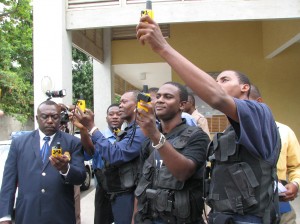
Crime Tech

- Grant’s Pen Police with handheld GPS devices courtesy of USAID COMET Programme and trained by the Mona GeoInformatics Institute.
There’s no question about it – the police need to get with the 21st century. They need to be equipped with the best tools available for the current threats and problems they face in today’s society. Threats are all over, but today’s complex society means that these threats range from the traditional murders, robberies and gang violence, to white collar crimes, fraud, extortion and so on. The police also have to deal with traffic issues as well. They have to deal with problems on the prevention side – patrolling and making sure crimes don’t occur – as well as response and post-crime work – scene-of-crime and subsequent investigations. They have to deal with international threats, with the guns- and drug-running plaguing us, not to mention people-trafficking. While some criminals are just plain dumb, others are high-tech operators, skilled at deception, misdirection, and flush with cash to buy their way out of anything and any situation. Thing is, it’s highly unlikely you’ll find a dumb criminal using high-tech toys (unless he gets caught, in which case he’s still dumb enough to get caught). On the other hand, it’s still the same police force having to police both dumb and smart criminals.
So we need to level the playing field. Technology is a great force-multiplier. But technology is useless unless it’s properly applied, otherwise it can do more harm than good. GPS is being used to gather intelligence as well as collect crime scene data, and will soon be used to manage fleet deployments. AFIS is being used to track fingerprints, and IBIS is doing the same for ballistics. Upgraded radio communications networks allow for secure transmission of information. And backing all of this up is a new breed of high-tech thinking cops, which is important to drive this effort.
Now the problems. Has anyone seen the conditions of the police stations in which cops are expected to operate? And some field cops have gotten so hardened by their job stresses that they fall back on pure instinctive behaviour – survival – than allowing technology to help them. Other cops don’t have that enlightened outlook; they only want more pay, more guns and more cars. Sure, these can help, but these could have helped them out 50 years ago, whether or not the crime situation was as bad then as it is now. What’s certain is that technology today is light years ahead of tech then. And if cops are supposed to be better than the criminals in terms of training etc, then let’s amp that up even further using the latest tech.
I have publications and conference presentations on the matter of the dichotomy of the operational and analytical dimensions of crime fighting, to say nothing of the non-crime-fighting role of the police. Technology can be woven in to all of this. This isn’t about technology however; this is about helping the police and the job they have to perform. So forget about all the stuff that tech COULD do – eye-in-the-sky blimps, city-wide CCTV, etc. These cost a TON of money, something we cannot afford now, regardless of the benefits. Solutions lie in simpler solutions, technology married to good, smart and well-trained police personnel. Solutions lie in communities no longer protecting criminals and distrusting cops (and cops no longer betraying their professions through corrupt and abusive practices). Solutions lie in wider society, both public and pricate sectors, playing a role. Technology – simple or sophisticated – can bind these solutions, but tech alone is not the solution.
The Gleaner reserves the right not to publish comments that may be deemed libelous, derogatory or indecent.
To respond to The Gleaner please use the feedback form.
Older Posts
- The shrinking widening world
- Style, no substance; Substance, no style; no Style no Substance
- Response after the Response
- World Cup Reality Check
- Energy Challenges
- Top Jamaican Scientists
- The Annual 12-Month Hazards Season
- A blog about blogs
- Playing to our Strengths
- Deep Sea Nightmare












